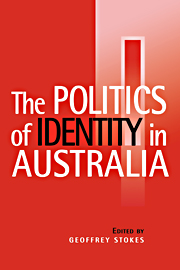Book contents
- Frontmatter
- Contents
- Acknowledgements
- Contributors
- Introduction
- Theorising Identity
- 1 Situating Australian National Identity in Theory and Practice
- 2 ‘Other Times’: Thatcher, Hawke, Keating, and the Politics of Identity
- 3 Universal Obligations: Liberalism, Religion and National Identity
- Gender and Sexuality
- Race, Place and Citizenship
- Culture: Literature and Film
- References
- Index
3 - Universal Obligations: Liberalism, Religion and National Identity
Published online by Cambridge University Press: 05 June 2012
- Frontmatter
- Contents
- Acknowledgements
- Contributors
- Introduction
- Theorising Identity
- 1 Situating Australian National Identity in Theory and Practice
- 2 ‘Other Times’: Thatcher, Hawke, Keating, and the Politics of Identity
- 3 Universal Obligations: Liberalism, Religion and National Identity
- Gender and Sexuality
- Race, Place and Citizenship
- Culture: Literature and Film
- References
- Index
Summary
‘From humanity, via nationality to bestiality’ – thus the Austrian poet Grillparzer is quoted in Joseph Roth's tale ‘The Bust of the Emperor’ (1986: 164). Roth then explores the sources of national sentiment and finds them in the envy and discontent of those who believed that their true worth had not been recognised in bourgeois society. The supporters of nationalism were ‘discontented teachers in primary schools who would have liked to teach in secondary schools, apothecaries’ assistants who wanted to be doctors, tooth pullers who could not become dentists, junior employees in the Post Office and railways'. This idea that nationalism was the refuge of the disappointed and unsuccessful is given further credence by Ernest Gellner's fable (1983: 58–62) of Megalomania and Ruritania in which he notes that Ruritanian intellectuals had far greater chances of gaining posts in an independent Ruritania than in the competitive environment of the Megalomanian metropolis. It seems confirmed in the Australian case when it is noted that major advocates of Australian nationalism, including Vance Palmer, P.R. Stephensen and Manning Clark, had each been less than successful in the metropolis.
Are therefore the advocates of a stronger national identity in Australia the arch enemies of humanity, leading us a further step down the road to bestiality and barbarism? Writing in 1860, John West (Sydney Morning Herald 5 July 1860) claimed that the common interests of mankind always took precedence over those of nationality because national feeling was only ‘sentiment’.
- Type
- Chapter
- Information
- The Politics of Identity in Australia , pp. 50 - 60Publisher: Cambridge University PressPrint publication year: 1997
- 1
- Cited by

